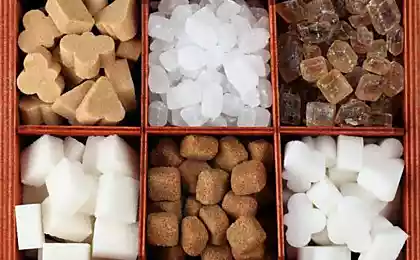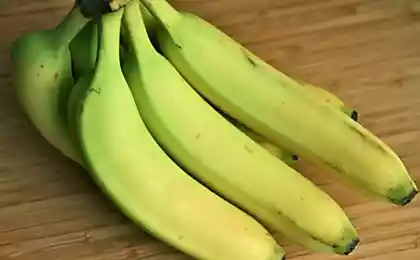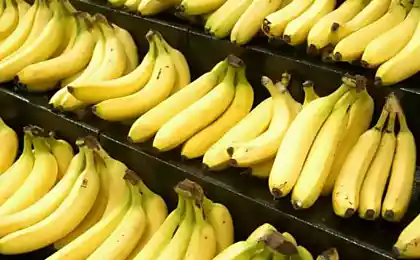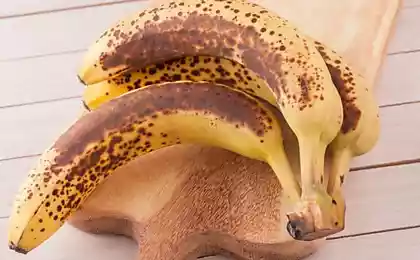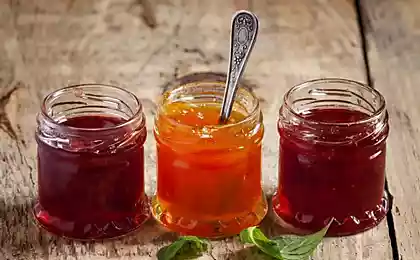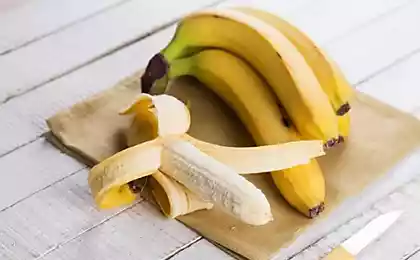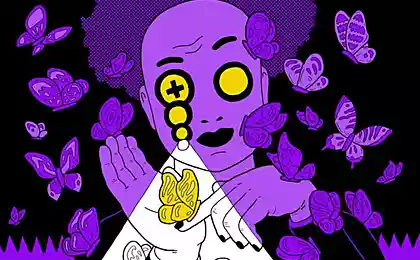542
Why don't need to buy yellow bananas
9 and 1 fact about how not ripen, ripen and become overripe bananas. And whether all these processes to manage at home.
1. Why the tear unripe bananas?
Despite its apparent durability, the banana is actually a fruit is very delicate. And generally can not be transported for long distances at temperatures above 14 degrees Celsius.
Therefore, the only way to bring bananas to the buyer "marketable" – to pluck their green and transported on vehicles equipped with refrigeration units.
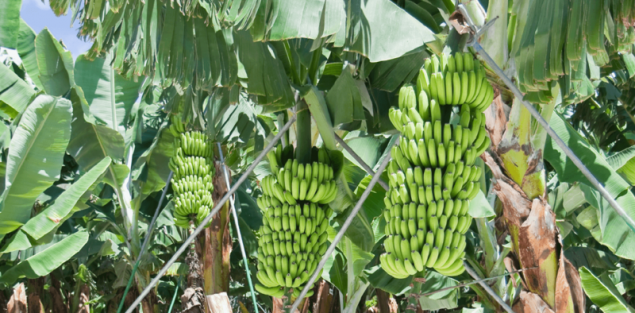
2. Why had bananas were greener?
We all remember that previously, not only grass, but the bananas were greener. This is due to the fact that in Soviet times, the sale of bananas without additional processing. As unloaded green bananas from the fridge and sent them to the sale.
Who had – bought one.
3. Why bananas are sent to the gas chamber?
To torn green banana ripe evenly it is subjected to aeration. It's such a controlled process, in which bananas are not only Mature faster, but do it more evenly and gently.
Bananas are placed in special storage chambers low (around 15°C) temperature and a certain humidity level. Then they are transferred to the aeration chamber, where it is heated and treated with a gas mixture.
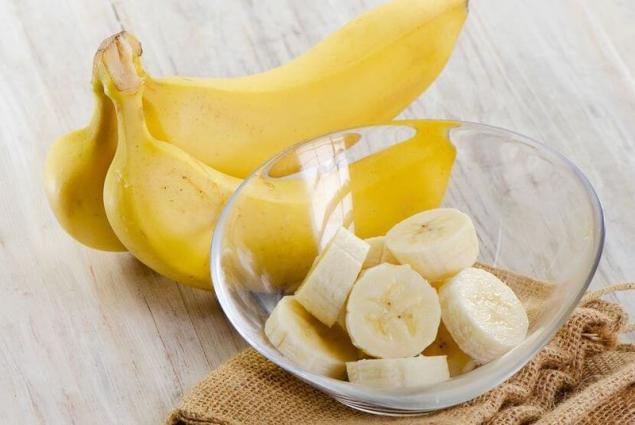
4. What is "banana gas" and if he's dangerous to humans?
This gas mixture (also called "banana gas") 5% of ethylene and 95% of nitrogen. This mixture is safe for human health analog of a natural substance secreted by the bananas in the natural process of ripening.
5. Why had bananas were tastier?
Although this gas mixture, harmless to humans, but the taste of bananas, deservably in the chamber aeration, still often differs for the worse in comparison with bananas, Dobriansky naturally.
Gasification can replace natural maturation, and because in Soviet times, camera aeration is not used, and marketed the bananas were delicious.
6. Why now do not sell "raw" bananas?
On the one hand, in a market economy, sellers of fruit can't offer customers green bananas: this product is just not competitive. To wait until the warehouse of the bananas themselves come to marketable condition in a natural way as possible.
First, it is not profitable to waste time on a product that is in stock and slowly turn yellow. And, secondly, with ripening in a natural way, there is no guarantee that the banana will turn yellow evenly.
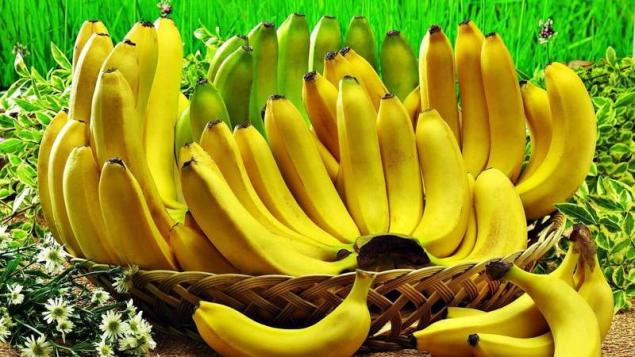
7. Can I eat green bananas?
Green banana says that it increased the content of starch has not yet turned into sugar. Because of this, to digest bananas are much more complicated: the starch is fermented in the large intestine and can cause flatulence.
Than a banana more ripe the greater part of the starch has turned into sugar, and therefore such bananas are not only sweeter, but also much easier to digest.
8. Can I eat blackened bananas?
Unfortunately, now consumers are increasingly faced with the fact that store-bought yellow bananas behave "atypical": extremely fast fade, deteriorate and lose the most "marketable" look for which they were treated with a gas mixture. This may be due to the fact that in the process of artificial "ripening" bananas supplier has violated the treatment regime.
Harm use these bananas will not bring, though pleasure does not deliver. For example, kids often refuse to eat bananas that have darkened skin, even if the inside of the banana looks completely normal and sweet to the taste.
9. How apples help the bananas to ripen?
If you still managed to buy green bananas (which is rather rare in our hard times), it is possible to independently bring them to the condition.
To do this, simply put green bananas in a package with some other fruits (e.g. apples or pears), which themselves produce ethylene, necessary for the bananas to ripen.
Yes, this process will be less "technological", but you are spared from the risk of next day after buying yellow bananas discover that they "shrunk", and their peel turns dark brown.
Also interesting: Bananas in caramel — simple and quick recipe
18 interesting facts about bananas
10. How to prevent bananas perezite?
To preserve bananas from darkening their stalk (or bananas entirely) the need to tightly wrap foil, cling film or clean plastic bag: this protects the bananas from ethylene contained in other fruits, if you put them in one basket together with the bananas.published
Author: Anna Tumanova
Source: roscontrol.com/community/article/pochemu-nugno-pokupat-zelenie-banani-a-geltie-ne-nugno/
1. Why the tear unripe bananas?
Despite its apparent durability, the banana is actually a fruit is very delicate. And generally can not be transported for long distances at temperatures above 14 degrees Celsius.
Therefore, the only way to bring bananas to the buyer "marketable" – to pluck their green and transported on vehicles equipped with refrigeration units.

2. Why had bananas were greener?
We all remember that previously, not only grass, but the bananas were greener. This is due to the fact that in Soviet times, the sale of bananas without additional processing. As unloaded green bananas from the fridge and sent them to the sale.
Who had – bought one.
3. Why bananas are sent to the gas chamber?
To torn green banana ripe evenly it is subjected to aeration. It's such a controlled process, in which bananas are not only Mature faster, but do it more evenly and gently.
Bananas are placed in special storage chambers low (around 15°C) temperature and a certain humidity level. Then they are transferred to the aeration chamber, where it is heated and treated with a gas mixture.

4. What is "banana gas" and if he's dangerous to humans?
This gas mixture (also called "banana gas") 5% of ethylene and 95% of nitrogen. This mixture is safe for human health analog of a natural substance secreted by the bananas in the natural process of ripening.
5. Why had bananas were tastier?
Although this gas mixture, harmless to humans, but the taste of bananas, deservably in the chamber aeration, still often differs for the worse in comparison with bananas, Dobriansky naturally.
Gasification can replace natural maturation, and because in Soviet times, camera aeration is not used, and marketed the bananas were delicious.
6. Why now do not sell "raw" bananas?
On the one hand, in a market economy, sellers of fruit can't offer customers green bananas: this product is just not competitive. To wait until the warehouse of the bananas themselves come to marketable condition in a natural way as possible.
First, it is not profitable to waste time on a product that is in stock and slowly turn yellow. And, secondly, with ripening in a natural way, there is no guarantee that the banana will turn yellow evenly.

7. Can I eat green bananas?
Green banana says that it increased the content of starch has not yet turned into sugar. Because of this, to digest bananas are much more complicated: the starch is fermented in the large intestine and can cause flatulence.
Than a banana more ripe the greater part of the starch has turned into sugar, and therefore such bananas are not only sweeter, but also much easier to digest.
8. Can I eat blackened bananas?
Unfortunately, now consumers are increasingly faced with the fact that store-bought yellow bananas behave "atypical": extremely fast fade, deteriorate and lose the most "marketable" look for which they were treated with a gas mixture. This may be due to the fact that in the process of artificial "ripening" bananas supplier has violated the treatment regime.
Harm use these bananas will not bring, though pleasure does not deliver. For example, kids often refuse to eat bananas that have darkened skin, even if the inside of the banana looks completely normal and sweet to the taste.
9. How apples help the bananas to ripen?
If you still managed to buy green bananas (which is rather rare in our hard times), it is possible to independently bring them to the condition.
To do this, simply put green bananas in a package with some other fruits (e.g. apples or pears), which themselves produce ethylene, necessary for the bananas to ripen.
Yes, this process will be less "technological", but you are spared from the risk of next day after buying yellow bananas discover that they "shrunk", and their peel turns dark brown.
Also interesting: Bananas in caramel — simple and quick recipe
18 interesting facts about bananas
10. How to prevent bananas perezite?
To preserve bananas from darkening their stalk (or bananas entirely) the need to tightly wrap foil, cling film or clean plastic bag: this protects the bananas from ethylene contained in other fruits, if you put them in one basket together with the bananas.published
Author: Anna Tumanova
Source: roscontrol.com/community/article/pochemu-nugno-pokupat-zelenie-banani-a-geltie-ne-nugno/
Batteries for wind generators on the bottom of the sea
We lie 10 to 200 times a day: the best TED talks about the truth and lies
